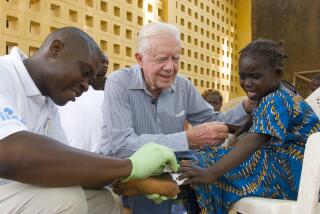AIDS: What a president could do
- Share via
Dear Presidents Bush and Mbeki:
I AM WRITING to you because you lead, respectively, the country spending the most on combating HIV/AIDS and the country with the highest burden of HIV/AIDS disease. Each of you is in the final years of your term in office, and it is time to ensure your legacy.
Your predecessors, President Clinton and President Mandela, both expressed the same regret now that they are out of office: They wish they had done more to marshal the power of their presidencies to combat the HIV/AIDS epidemic.
Let me encourage you not to look back with the same regret when you could instead make your vigorous and energetic efforts against HIV a hallmark of your tenures, when you could instead look with pride at the lives you saved.
Mr. Bush, you can be proud of the President’s Emergency Plan for AIDS Relief. I have seen firsthand the wonderful results of your commitment of $15 billion over five years. When I first started working in South Africa five years ago, no physicians wanted to treat people with HIV. Now, I have personally visited clinics in South Africa funded by your relief plan, and the hope and optimism are palpable, the way it was in 1996 in the United States, when lifesaving antiretroviral therapy became available.
Mr. Mbeki, five years ago there were Armageddon-like predictions that the economy of South Africa was going to collapse under the weight of HIV. But instead the economy is thriving. You are working hard to deliver on promises of free healthcare for mothers and infants, clean water, electrification and universal education. Your belief is right on the mark that eradicating poverty and the conditions that fuel HIV will help to ameliorate the effects of the disease.
But both of you have the opportunity to do more to counteract what is the world’s most lethal epidemic in centuries.
Here is a plan of action:
1) Make young women a particular focus of your efforts. In South Africa, as in many other sub-Saharan African countries, 25% to 30% of young women will have HIV by the time they are 25. They are getting it by having unprotected sex with older men, in some cases because of sexual violence. Gender equality must be your policy in dealing with AIDS, and you must establish specific programs to protect young women.
2) Create specific HIV/AIDS treatment and prevention services for the poor. Those with the fewest resources must be provided with special access to programs.
3) Pursue comprehensive sex education at all levels of the school and health systems. Programs that primarily work to delay the onset of first intercourse are a good thing, and they have probably helped push down rates of HIV in Uganda. Abstinence and monogamy are also important strategies to encourage. But sex education also means making sure that people have access to complete information, to condoms and other life-saving strategies when they need them.
4) Emphasize the link between drugs and alcohol and unsafe sex, and encourage liquor manufacturers to donate a portion of their profits to the effort to fight AIDS. The last time I was in South Africa, I counted upward of 20 advertisements for alcohol on the road from Johannesburg to Soweto, but not one condom ad.
5) Insist that businesses de-stigmatize HIV in the workplace and offer benefits that cover HIV treatment for patients and families.
6) De-stigmatize HIV yourself. Be seen in the presence of people with HIV, touching them and demonstrating care and compassion.
7) Get tested -- publicly -- for HIV, and encourage everyone in your country to do so.
Tomorrow marks another World AIDS Day. Mr. Mbeki and Mr. Bush, whatever your differences on other matters, now is the time to consider what you together can accomplish in the battle against this disease. If the two of you stand as one and declare your commitment to the strategies I’ve listed, you would capture the imagination -- and the will -- of the whole world.
THOMAS J. COATES is professor of medicine at the David Geffen School of Medicine at UCLA. He is director of the UCLA Program in Global Health and the associate director of the UCLA AIDS Institute.
More to Read
Sign up for Essential California
The most important California stories and recommendations in your inbox every morning.
You may occasionally receive promotional content from the Los Angeles Times.










